Jake Taber is a young man in a hurry. At 21, the Traverse City, Mich., resident has already built an impressive resumé as an IT professional, earning an associate degree and several industry-recognized certifications along the way.
An avid video gamer since his middle school years, Taber always knew that his future would be wired. And thanks to an innovative program offered by Michigan’s community colleges, that future is arriving even faster than he planned.
The program doesn’t just improve Taber’s immediate career prospects in information technology. Because it gave him traditional college credit for the certificates he earned, he now has a head start on further education if he someday chooses to pursue it.
One criticism of certificate programs in general—even though they have value and lead directly to jobs—is that too few translate into college credits. For many certificate students, perhaps even most of them, that doesn’t matter. But Michigan’s community colleges wanted to give students options—and incentives to continue their education. So several colleges changed longstanding practice by awarding academic credits for industry-recognized credentials, creating a clear pathway to an associate or bachelor’s degree.
“It’s critically important that credit be embedded in the student experience,” said Erica Orians, executive director of the Michigan Center for Student Success at the Michigan Community College Association. “There are many ways to get trained, and we want to honor all of them.”
For instance, if a student took a course resulting in a Cisco Systems cybersecurity credential (a popular program), he or she could get credit for the entire college-level Cisco Certified Network Associate (CCNA). “You would get credit for Computer Information Systems 101, an associate-level course that prepares students for a credential,” Orians said. “Maybe you could get three certifications or an industry-recognized credential.”
Serving students in this way means making big changes in requirements, and sometimes curriculum, which can create more work for faculty and registrars and other administrators. But colleges across the state are taking lessons from credit-awarding programs already in place at Northwestern Michigan College, Grand Rapids Community College, and Macomb Community College.
Northwestern Michigan College (NMC) is a two-year institution in Traverse City that serves as a transfer launch pad for most of its students, said Jason Slade, the college’s vice president for strategic initiatives. “We are trying to embed credits more and more in our programs, especially those that lead directly to the workforce,” he said. “Listening to our students, we realized that so many of them already had the skill sets, and having them come through the (credit-bearing) class again did not make sense.”
A certificate also gives the college a quick way to evaluate student learning to determine whether a student deserves that credit. “Some (colleges) use portfolios to evaluate students, but that can be somewhat subjective,” Slade said. “So we really came at this in a very straightforward way to verify that an assessment had occurred and that it was at a level we could award credit for.”
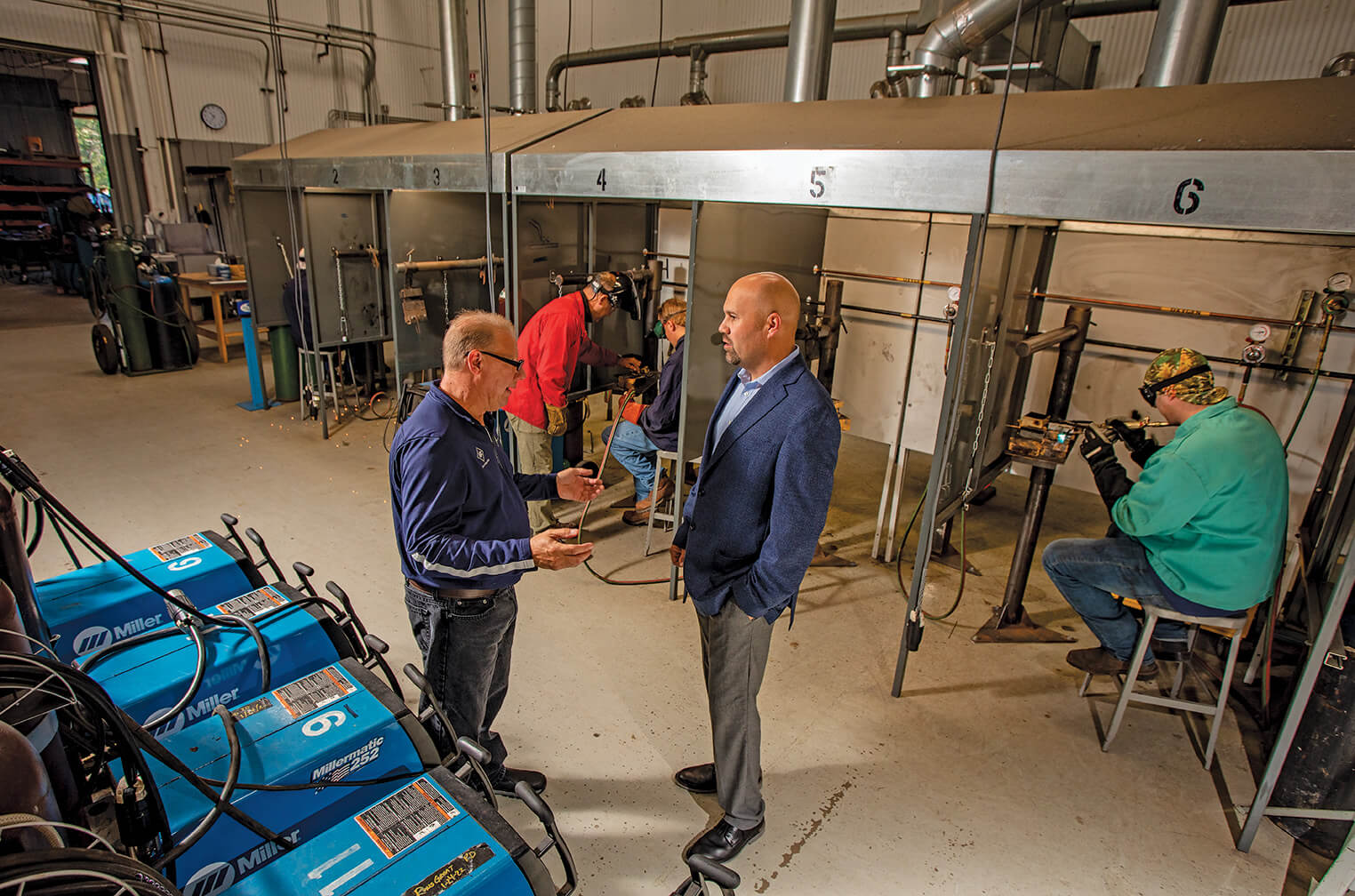
The occupational programs at NMC attract students with diverse backgrounds and learning styles. But what they all have in common is a desire to expedite their education. “This is one method to basically accomplish that,” Slade said. “We want to get them quickly from point A to point B, whether that is the workforce, an associate degree, or transfer.”
Jake Taber is one of those students on the fast track. A video game aficionado since his early teens, he always saw his future in computers, at first thinking he’d become a game designer, But in high school Taber realized the information technology field was the better choice—a career that offered more options for someone with his skills.
Taber took the opportunity to learn about and train for that career sooner rather than later. In his junior and senior years in high school, he pursued a dual-enrollment option in connection with a local trade school that honed his IT skills. After completing the requisite English, math, and other traditional courses, he got lots of hands-on training in information technology. So upon graduation, along with his high school diploma, he picked up two industry-recognized certificates: TestOut PC Pro and TestOut Network Pro, both of which recognize proficiency in basic IT skills.
Taber, then only 19, immediately built on these credentials with a TestOut A-Plus certificate. With these credentials, he landed a summer internship at a local nonprofit, where he taught staff how to use various computer programs and set up their new devices and software. He then quickly landed an entry-level IT position at Interlochen Arts Academy, where he expanded his learning on Apple products. “It was all because of these certifications that I was fortunate to get the jobs,” Taber said.

Armed with this experience and his certificates, he started an associate degree program at Northwestern Michigan College. Tuition was free thanks to scholarships he had earned through being an Eagle Scout. And because of the college’s new credit-for-credentials policy, he again got a head start: He was awarded six college credits for the A-Plus certificate. This allowed him to skip two college courses, cutting his time to a degree.
“They said, ‘Just send us a copy of that certificate, or bring it to us, and we’ll waive that required course,’” Taber recalled.
He moved quickly through his other courses, completing the required general education courses while moving on to his specialized work. He earned his associate degree in 2021 and, by passing the final college IT exam, also graduated with a Microsoft Technology Associate certificate. “So I had that to put on my resumé right away to get an IT job right away.”
Taber recently took a job as an IT assistant at RJC Inc., a worldwide training, technology, and consulting company that specializes in the mold-injection industry.
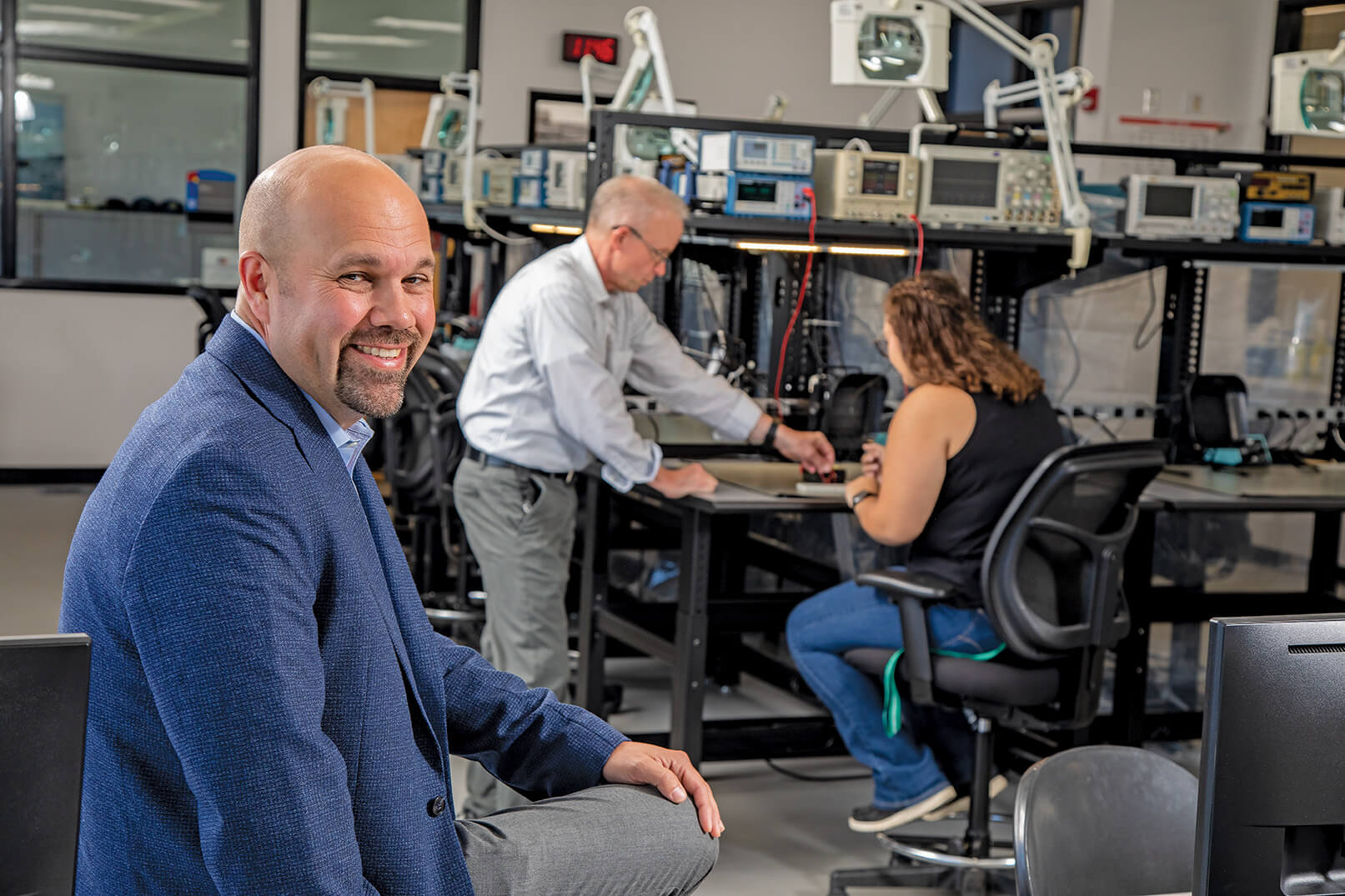
Check the alignment
In deciding what credentials deserve credit, NMC administrators rely on the college’s subject matter experts—the faculty and staff who are leading the individual program areas. Then they work through the course list to determine which certifications align.
“It can be really easy if the output of a course is a certification,” Slade pointed out. “If the goal of the course is to earn a credential, and if someone already has that credential, they should get the credit.”
Things get trickier, he said, when a student has a certification that doesn’t line up with a particular course, but which might cover parts of multiple courses or a segment of a program.
Welding is an example. “We have different levels of certification, which are the American Welding Society requirements, and based on how that student progresses with those, we can backfill to the appropriate course,” Slade said. “That lays out a little bit differently from our welding program, which takes students through a number of different welding processes, and then we have an overarching certification course, where they go and test for all those skills. So we just kind of map it back.”
NMC has a distinct advantage in that it is a relatively small institution with about 3,500 students. That means it is nimble enough for students to have one-on-one conversations with advisors and key faculty members right from the start to make sure the college is giving appropriate credit, Slade said. “I like to give that caveat because some of our partners who are working their way through (credit for certification) are 10 times larger than we are.”
Some community colleges are still reluctant to award credit for certification, but attitudes are changing—particularly as institutions in the vanguard show how it’s done. Other institutions, Slade said, “want to know: ‘Will this work for this program’ or if it’s not quite a perfect fit, ‘How do we make it work?’ “
So, in those cases, how do they make it work? The college has a couple of options, Slade said. It can restructure the academic course, or it can add a certification to it. The college also could consider each student’s experience on a case-by-case basis. “We might have somebody with a certificate but also with some additional work experience that shows they have met the required outcomes for that course. But somebody else may not have that, so you have to sift through it.”
NMC offers a number of workforce development courses that don’t follow the academic calendar. But as workforce faculty develop this non-credit training, Slade said, they work with the academic side to ask: “If we brought a student through this training and they got a certification, what would it look like on the credit side?” By having that discussion up front, he said, the college can design that certification along with the training to align with the academic program.
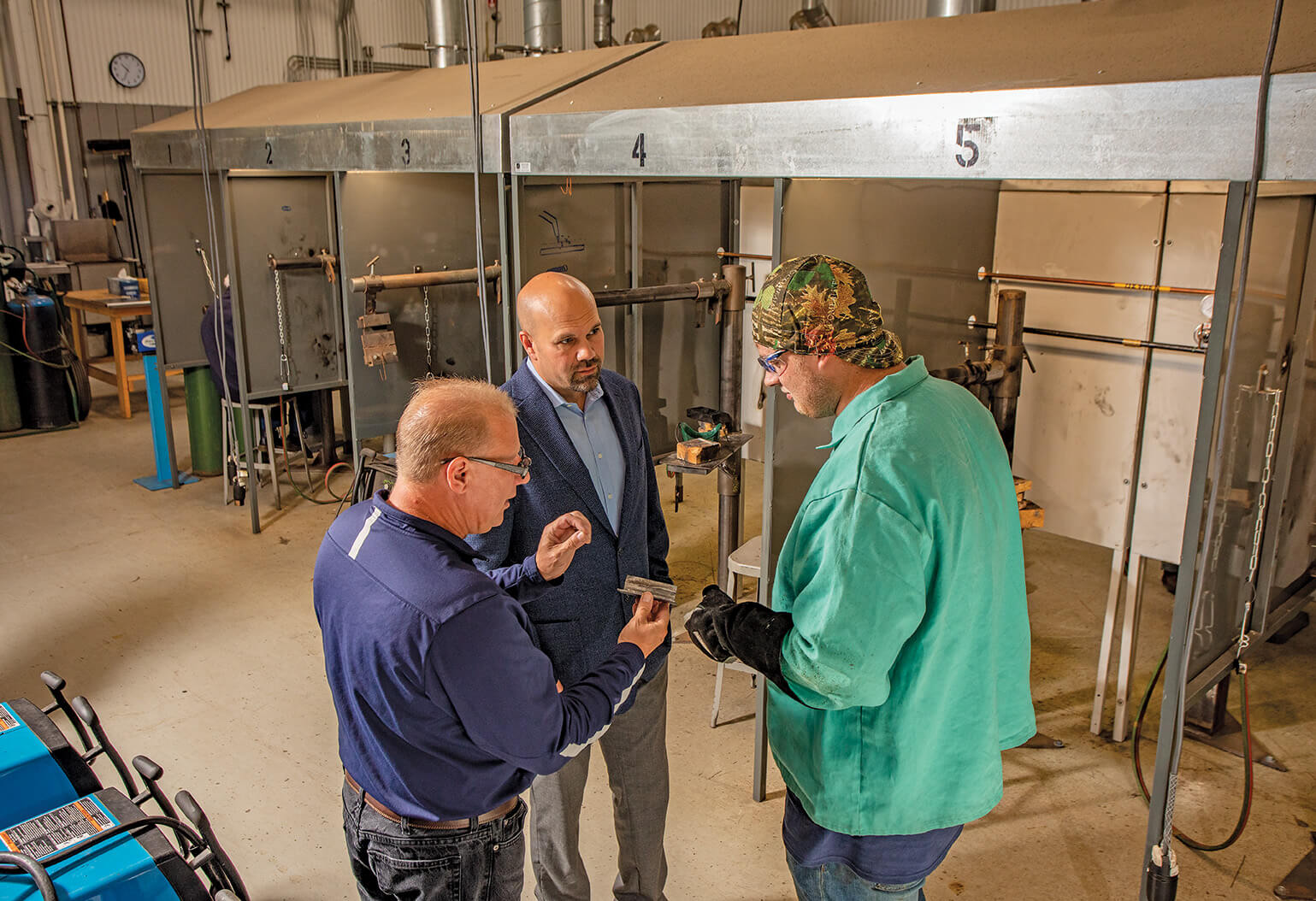
The college doesn’t break out data on how many credit-earning certificate students continue on to an associate degree, but it has seen a changing demographic, Slade said. “These students usually come in with that credit that gives them a quick win in college, and once they have that success they want to stay. It gives them that confidence that they can excel in that program.”
As to Jake Taber, he has no plans right now to pursue a bachelor’s degree. “The IT field is focused on experience and certificates,” he noted.
And as invested as he now is in information technology, he’s not lost his love for playing and collecting video games. Shopping at vintage video stores and garage sales, he has amassed a collection of some 450 titles (he keeps a spreadsheet) going back to the original Nintendo of 1985. And yes, this means he’s also collected more than 30 consoles.
If credentials were awarded for gaming, he would certainly qualify.
Help for the harried
The credit-for-credential program that benefited Taber isn’t the only effort to boost educational attainment among Michigan’s working residents. Another initiative, Futures for Frontliners, aims to help those who arguably worked hardest during the COVID-19 pandemic.
At the pandemic’s height, when many workers retreated to home offices—working flexible schedules to care for their children—countless others had no choice but to work in person, often under rigid schedules that left them struggling to take care of their own children and ailing family members. They were health care workers, police officers, and repair technicians; servers, truck drivers, and grocery clerks—all the people who kept our lights on, our food coming, and our packages delivered.
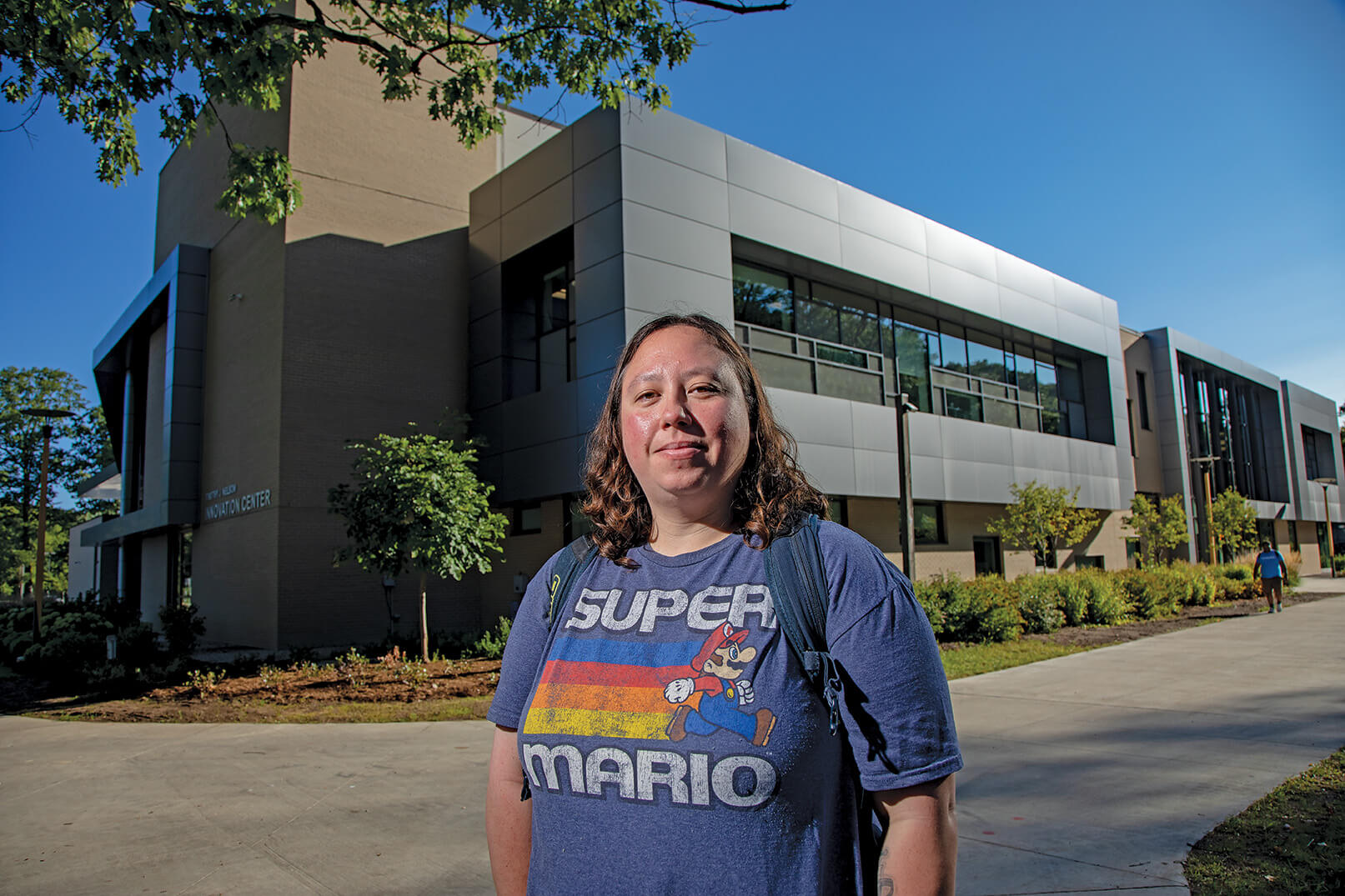
It is these “frontline workers” that the state of Michigan is rewarding with a big economic boost to their post-high school educations. With its Futures for Frontliners initiative, the state provides qualifying individuals with grants toward a degree or certificate at colleges throughout the state. Paid for with state emergency funds through the federal CARES Act, it’s another effort to help the state meet its goal of having 60 percent of adults with college degrees or credentials by 2030.
Among the beneficiaries of the grant program is Kelley Nelson, 39, of Bellaire. All during the pandemic, Nelson was helping to run the IT system at Shanty Creek, a northern Michigan ski and golf resort, reporting in person every day to equip, train, and support other staff members who were working remotely.
Two decades ago, Nelson graduated from high school unsure of what she wanted to do. “College was expensive,” she said, “and I had five sisters, so we kind of had to fend for ourselves.” She planned to take two years off to help pay for college later, initially taking a job repairing golf carts at Shanty Creek. “I’ve always liked taking things apart and putting them back together,” she said.
That led to a stint as an office assistant at the same resort, after which Nelson took a chance and responded to an opening for an IT staffer there. She had no formal training in computer technology, but she had taught herself enough in her office position, through handbooks and tutorials, to qualify for the job. Once in the position, she learned even more from IT staff, hands-on, including lessons in cybersecurity, which was among the business’s growing concerns.
College was a vague plan in her mind, Nelson said. But at that time and in the many years since, “it was just never the right time,” she said. “We were always short-staffed at the resort, and classes tended to be offered during the day.” She had also bought a house, so money was tight.
But last year Nelson heard about Futures for Frontliners. “I worked during the whole pandemic,” she said, “but I think a lot of people forgot about the IT people.” Fortunately the state of Michigan did not, offering her a grant that cut her expenses at Northwestern Michigan College by more than half. She is now studying computer information technology with a concentration in infrastructure and cybersecurity.

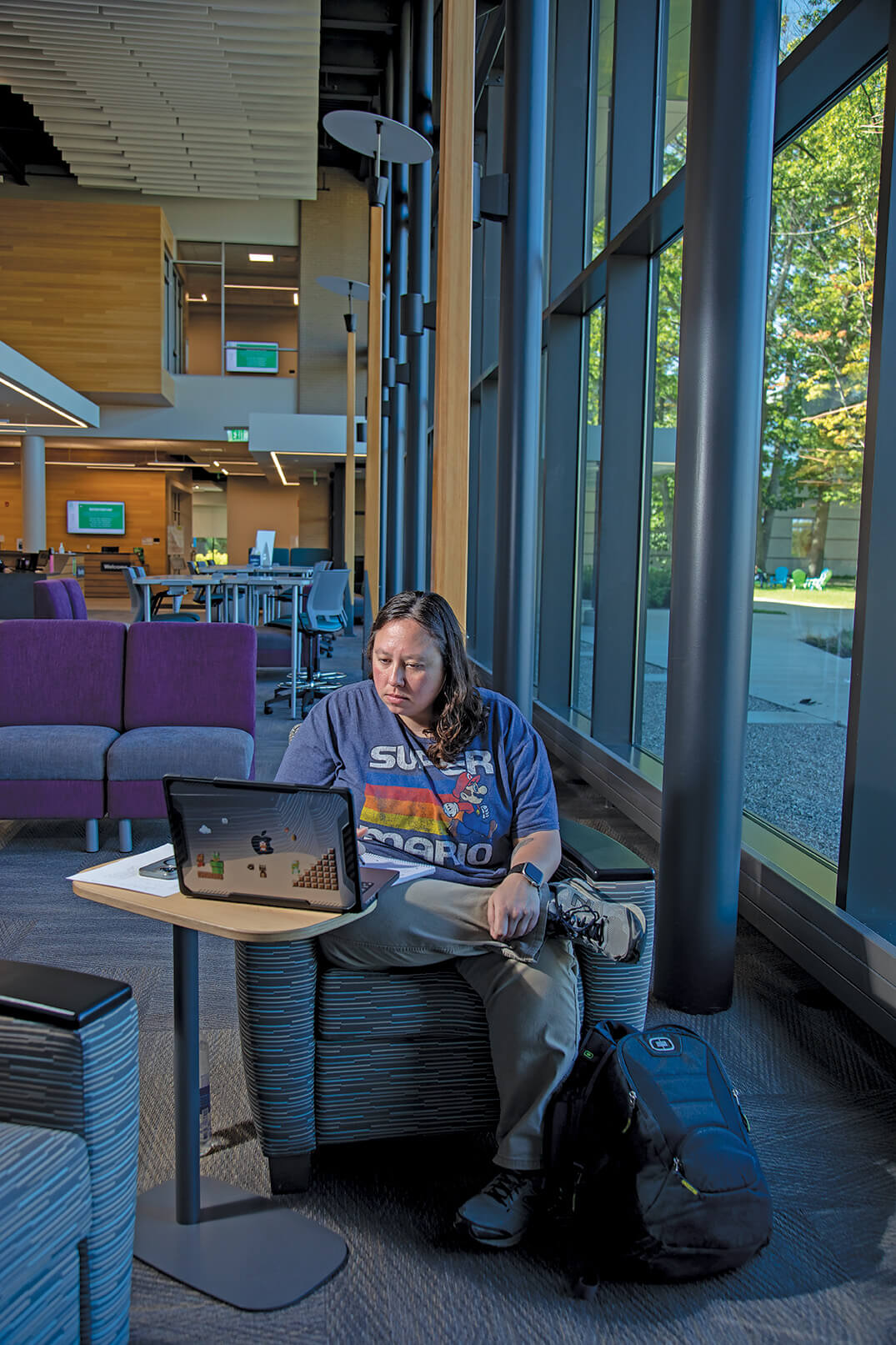
Nelson had at first planned to go only for certificates. And she is collecting them rapidly: Cisco, Microsoft Technology Assistant, Pearson Information Technology Specialist, Information Technology for Networking and TestOut Network Security. But as she has seen her credentials and credits accumulate, she now sees a clear path to a college degree. So she is going for it. She’s on track to earn an associate degree in applied science next year.
The next few months will be challenging, Nelson admitted. She is still working full time (at a different resort), and going beyond the certifications means taking some pre-college math and a couple of English courses. Plus, the commute is a bear: Her new workplace is a half-hour’s drive south of her home, and the college another half-hour south of that. But NMC, she says, gives her flexibility and exceptional support. For instance, she will be able to take math classes online next summer.
Throughout the process, Nelson’s attitude about higher education has markedly changed. “I never really liked school,” she conceded. “It wasn’t horrible, but I dreaded the thought of spending all that money for college and the worry of dropping out.” Those worries are gone, she said, and that has everything to do with the college going the extra mile.
“My teachers are amazing, and they make the classes so much fun. They also know that I’m working full time, so they worked with me to shift schedules. When I have to miss a class, they record it and email it to me after hours.”
So with all of these credentials and credits, does Nelson want to continue on to a bachelor’s degree?
“I’ve thought about that,” she said. “But it costs a lot of money and takes a lot more time. In my IT field, some companies look for a degree, but in my current job, everyone is looking for experience and certificates, and that beats out a B.A.”
Nelson lives in northwest Michigan, a region of rolling hills, cool summers, farms, and orchards. Her home is just miles from the cold, clear waters of Torch Lake, an isthmus away from Lake Michigan. She works at a resort that’s as beautiful in summer as it is in winter. “God’s country,” she calls it.
“I’ll see I how feel towards the end,” Nelson said. “Right now I need a break.”
